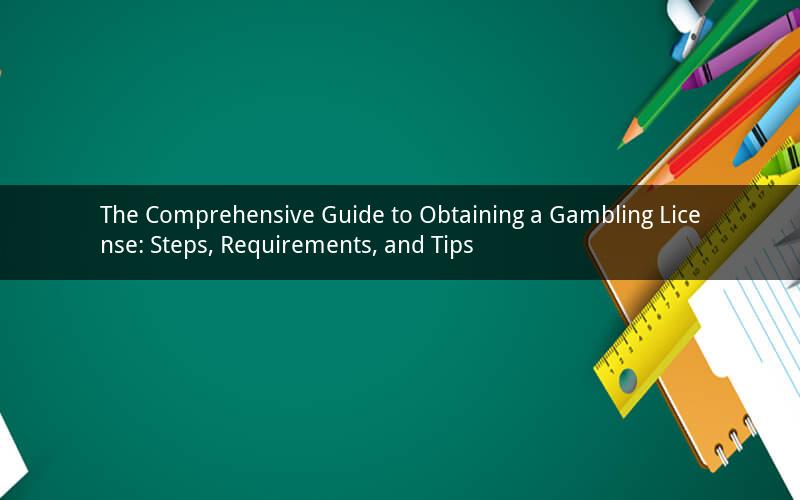
Introduction:
Obtaining a gambling license is a crucial step for any business looking to enter the gaming industry. Whether you are planning to launch an online casino, a land-based casino, or a sports betting platform, having a valid gambling license ensures that your operations are legal and compliant with regulatory requirements. This article provides a detailed guide on how to get a gambling license, including the necessary steps, requirements, and tips for a successful application process.
1. Understanding the Different Types of Gambling Licenses
Before diving into the application process, it's important to understand the different types of gambling licenses available. Here are some of the most common types:
- Casino License: This type of license allows operators to offer various casino games, including slots, table games, and poker.
- Sports Betting License: This license enables operators to accept bets on sports events and provide betting platforms.
- Lottery License: This license allows operators to conduct lottery games, including scratch cards, instant win games, and online lotteries.
- Bingo License: This license permits operators to conduct bingo games, both online and offline.
1. Researching the Regulatory Requirements
Each country or region has its own regulatory requirements for obtaining a gambling license. It's essential to thoroughly research the specific regulations of the jurisdiction where you plan to operate. Here are some key aspects to consider:
- Licensing Authority: Identify the licensing authority responsible for regulating gambling in your target jurisdiction. This could be a government agency, a specialized commission, or a self-regulatory organization.
- Eligibility Criteria: Understand the eligibility criteria for obtaining a gambling license. These may include factors such as business experience, financial stability, and compliance with anti-money laundering (AML) and counter-terrorist financing (CTF) regulations.
- License Cost and Renewal: Research the cost of obtaining and renewing a gambling license. This can vary significantly depending on the jurisdiction and the type of license.
2. Preparing the Gambling License Application
Once you have a clear understanding of the regulatory requirements, it's time to prepare your gambling license application. Here are some key steps to follow:
- Company Formation: Establish a legal entity in the jurisdiction where you plan to obtain a gambling license. This may involve registering a company, obtaining a business license, and opening a bank account.
- Background Checks: Conduct thorough background checks on all key personnel involved in your business. This includes directors, shareholders, and employees who will have access to sensitive information.
- Financial Statements: Prepare accurate and up-to-date financial statements, including balance sheets, income statements, and cash flow statements. These will be used to demonstrate your financial stability and ability to operate a gambling business.
- AML and CTF Compliance: Implement robust AML and CTF policies and procedures to ensure compliance with regulatory requirements. This may involve conducting risk assessments, implementing internal controls, and training staff.
3. Submitting the Gambling License Application
Once you have prepared all the necessary documents, it's time to submit your gambling license application. Here are some tips for a successful submission:
- Complete Application Form: Ensure that you complete the application form accurately and provide all the required information. Double-check for any missing or incomplete details.
- Attach Supporting Documents: Attach all the required supporting documents, including company documents, financial statements, background checks, and AML/CTF policies.
- Pay Application Fees: Pay any applicable application fees, which may vary depending on the jurisdiction and the type of license.
- Follow-Up: Keep track of your application status and follow up with the licensing authority if necessary. This may involve providing additional information or clarification on certain aspects of your application.
4. Post-Licensing Compliance
Obtaining a gambling license is just the beginning. Once you have a valid license, it's crucial to maintain compliance with regulatory requirements. Here are some key aspects to consider:
- Regular Audits: Conduct regular internal and external audits to ensure ongoing compliance with gambling regulations.
- Employee Training: Provide regular training to employees on gambling regulations, AML/CTF policies, and responsible gambling practices.
- Responsible Gambling: Implement responsible gambling policies and measures to protect players and prevent problem gambling.
- Data Protection: Ensure compliance with data protection regulations, such as the General Data Protection Regulation (GDPR), to protect player data.
5. Frequently Asked Questions (FAQs)
1. Q: How long does it take to obtain a gambling license?
A: The time it takes to obtain a gambling license varies depending on the jurisdiction and the complexity of the application. It can range from a few months to over a year.
2. Q: What are the main factors that can delay the gambling license application process?
A: Several factors can delay the application process, including incomplete or incorrect application forms, missing supporting documents, and non-compliance with regulatory requirements.
3. Q: Can I apply for a gambling license without a physical presence in the jurisdiction?
A: Some jurisdictions allow operators to obtain a gambling license without a physical presence. However, it's essential to research the specific regulations of your target jurisdiction to ensure compliance.
4. Q: What are the costs associated with obtaining a gambling license?
A: The costs associated with obtaining a gambling license vary depending on the jurisdiction and the type of license. These costs may include application fees, legal fees, background check fees, and compliance costs.
5. Q: How can I ensure a successful gambling license application?
A: To ensure a successful application, thoroughly research the regulatory requirements, prepare a comprehensive application, comply with all applicable regulations, and maintain ongoing compliance after obtaining the license.
Conclusion:
Obtaining a gambling license is a complex and time-consuming process. However, by following this comprehensive guide and understanding the necessary steps, requirements, and tips, you can increase your chances of successfully obtaining a gambling license. Remember to thoroughly research the specific regulations of your target jurisdiction, prepare a thorough application, and maintain compliance to ensure a successful entry into the gaming industry.